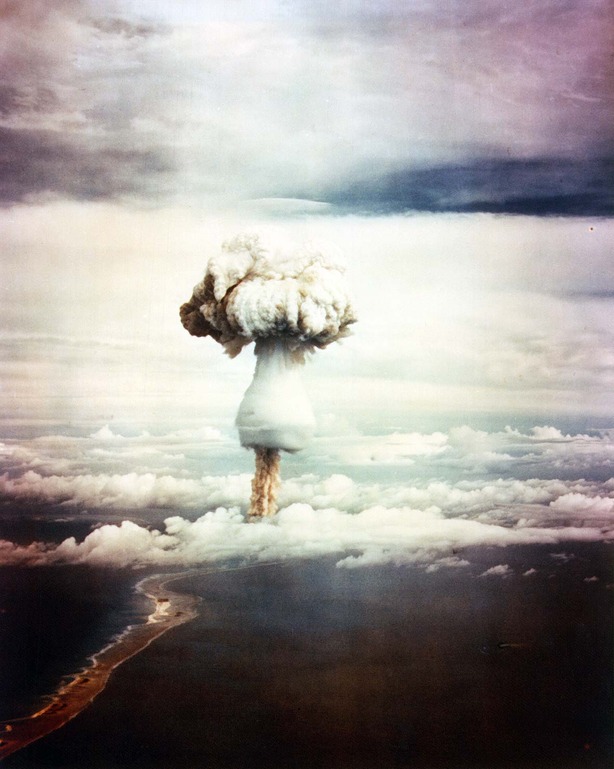On Nuclear Weapons as Units of Measurement
What does it really mean when we say last week's meteor delivered a force 30 times the size of the Hiroshima bomb?
Perhaps you saw the reports last week, as the world tried to wrap its collective mind around the piece of outer space that had arrived at our small piece of inner space, that the Russian meteor exploded "with the force of 30 Hiroshima bombs."
And, wow, that sure seems big. And it's true: The Russian meteor was a monster -- the biggest in a century, rocking the city of Chelyabinsk and injuring more than a thousand of its residents.
But even so, even considering the destructive potential of meteors and the punch they can deliver, comparing a meteor's force to a nuclear bomb is a pretty sloppy equation, argues atomic historian Alex Wellerstein, and in its sloppiness, the comparison runs into all sorts of troubles.
"Every time we have a natural disaster, somebody translates the energy output into kilotons and then tells you, using a simple division equation, how many times more that is than Hiroshima," Wellerstein told me. "This is something I find really problematic."
"In general," he added, "What I don't like is ... the idea that kiloton or a megaton is just an energy unit, that it's equivalent to so many joules or something. Because you could do that. You could claim that your house runs so many tons of TNT worth of electricity per year, but it sort of trivializes the notion."
He breaks his concern down into two separate but related points: First off, he writes on his blog, the character of a nuclear blast is not really comparable to a non-nuclear explosion, even when the amounts of force delivered are similar. "It's just sort of a raw energy output with no attention to exactly how that energy is being delivered. And without attention to that, it doesn't really tell you what would happen other than that, yes, if a meteor hit your town directly it would flatten most of your town, and, yes, a nuclear weapon would also flatten most of your town."
But nuclear weapons deliver more than just sheer force; there's also incredible heat, orders of magnitude hotter than a meteor's explosion, (most of the people who died at Hiroshima and Nagasaki, Wellerstein says, died of fire), and, of course, the radiation. The radiation brings sickness, makes land uninhabitable in the long term, and can have residual genetic effects that long outlast the bomb's immediate destruction. "It's sort of the sum of these effects that we think of when we think of what's the problem with nuclear weapons," he says. To only think of an atomic weapon in terms of the kilotons of energy released glosses over the totality of the terror these bombs bring.
It's one thing to use an atomic explosion as a unit for describing a meteor's explosion -- the two are similar in that much of their energy is released as a blast wave -- but the comparison is even worse when applied to other sorts of disasters, Wellerstein contends. "My least favorite is when this sort of thing is applied to literally non-explosive phenomena: tsunamis, earthquakes, tornadoes. These are sometimes talked about in terms of their energy release. And you can always quantify an energy release -- you can just do the conversion to nuclear units and say, 'Oh my God look how much energy this is!' But, you know: An earthquake is a very different release of energy; a tsunami is a very different release of energy. The effects are just not comparable. They're nothing like nuclear weapons."
Wellerstein's second concern boils down to his doubts that these comparisons really serve the public in any way. What does it even mean to say that something is 30 times the size of Hiroshima? Do people have a really strong sense of even what one Hiroshima looks like, and can they then imagine an energy release 30 times that? "Heck, I barely have any point of reference and I'm constantly searching for them!" he wrote on his blog.
Obviously, reporters are just trying to convey that the meteor was huge. And Wellerstein says he gets that. "But I feel like you could do that without making people get the untrue sentiment that nuclear weapons are small. If even a very small nuclear weapon, if it went off in a modern city, would be an atrocious thing."
He'd prefer to see writers try to convey a meteor's effect through direct description. "Rather than using nuclear terminology, and then down-scaling to explain how the effects are actually not quite the same... just tell us the actual effects and forget the nukes!" he writes. "If one must do things in response to nukes, do it the other way around: find out the actual effects of the meteor (or whatever), then tell us what yield nuke gives you those effects. It's less sensational, sure, but it'll help people understand both meteors and nukes better."
